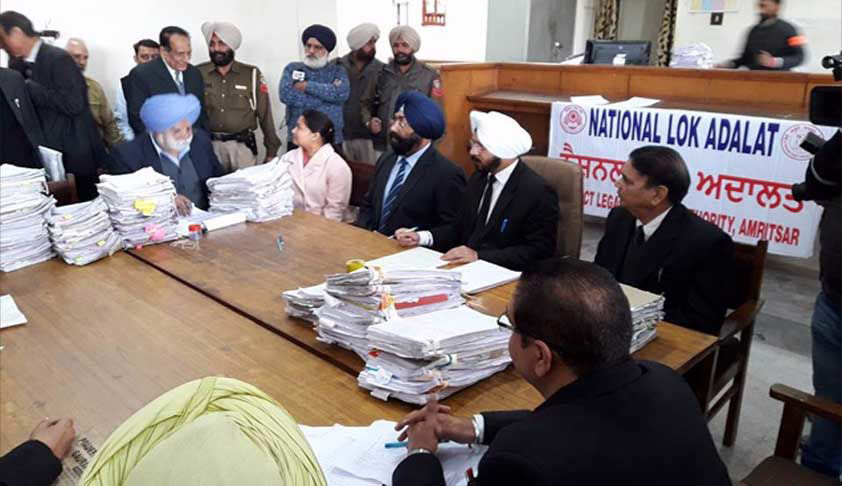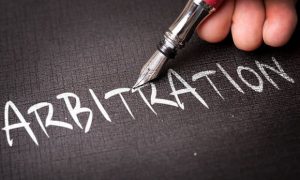Table of Contents
Introduction
Lok Adalat is one of the alternative dispute redressal mechanisms, it is a forum where disputes/cases pending in the court of law or at pre-litigation stage are settled/ compromised amicably. Lok Adalats have been given statutory status under the Legal Services Authorities Act, 1987. Under the said Act, the award (decision) made by the Lok Adalats is deemed to be a decree of a civil court and is final and binding on all parties and no appeal against such an award lies before any court of law. First time lok adalat was held in Gujarat in 1999.
Lok Adalat is a system of a dispensation of justice which has come into existence to grapple with the problem of giving cheap and speedy justice to the people. Lok Adalat as the very name suggests means People’s Court. ‘Lok’ stands for “People” and the ‘Adalat’ means “Court”.
The Lok Adalat has also been organized even for the cases pending in the Supreme Court.
Lok Adalats are known as People’s festivals of justice because settlements are not always necessarily according to legal principles settlements have an eye mainly on;
- Social goals like ending quarrels.
- Restoring family peace.
- Providing succor for destitute.
Nature and Scope Of Lok Adalat
Generally speaking, Lok Adalat is not a court in its accepted connotation. The difference between Lok Adalat and law court is that the law court sits at its premises where the litigants come with their lawyers and witnesses and go to the people to deliver justice at their doorstep. It is a forum provided by the people themselves or by interested parties including social activities or social activist legal aides, and public spirited people belonging to every walk of life.
The basic philosophy behind the Lok Adalat is to resolve the people’s dispute by discussion, counseling, persuasion and conciliation so that it gives speedy and cheap justice, mutual and free consent of the parties. In short it is a party’s justice in which people and judges participate and resolve their disputes by discussion, persuasion and mutual consent.
Constitutional Provisions
Article 39A of the constitution of India provides for free legal aid to the poor and weaker sections of the society and ensures justice for all. Article 14 and 22(1) of the Indian constitution is fundamental right mentioned in part Ⅲ. It also makes it obligatory for the state to ensure equality before law and a legal system which promotes justice on the basis of equal opportunity to everyone.
Here, the free legal services include:
- Payment of court fee, process fees and all other charges payable or incurred in connection with any legal proceedings.
- Providing services of lawyers in legal proceedings.
- Obtaining and supply of certified copies of orders and other documents in legal proceedings.
- Preparation of appeal, paper book including printing and translation of documents in legal proceedings.
The persons eligible for getting free legal services include:
- Women and Childrens.
- Members of SC/ST.
- Industrial workers.
- Victims of mass disaster, violence, flood, drought, earthquake, industrial disaster.
- Disabled persons.
- Victims of trafficking in human beings or beggar.
- Persons whose annual income does not exceed Rs. 1 lakh (in the Supreme Court Legal Services Committee the limit is Rs. 1,25,00).
Types of cases at Lok Adalat
The types of cases dealt with generally are:
- Mutation of land cases.
- Compoundable criminal offences.
- Family disputes.
- Encroachment on forest lands.
- Land acquisition disputes.
- Motor accident claim, and Cases which are not sub-judice.
Constitution & Composition Of Lok Adalat (Section 18)
The State Legal Services authority or the District Legal Services Authority or the Supreme court Legal Services Committee or the High Court Legal Services Committee or the Taluk Legal Services Committee may organise Lok Adalats at such intervals and places and for such areas as it thinks fit.
Every Lok Adalat organised for an area shall consist of such number of serving or retired judicial officers and other persons of the area as may be specified by the agency such as State Authority, District Authority or Supreme court legal services committee, High court legal services committee or may be by Taluk legal services committee.
Generally, a Lok Adalat consists of-:
- A judicial officer as the chairman and a lawyer as (ADVOCATE).
- A social worker as members.
- The experience and qualifications of persons. Referred to in clause (b) of sub sec. (2) of Section18 for Lok Adalats shall be such as may be prescribed by the government in consultation with the chief justice of the High Court.
Jurisdiction Of Lok Adalat
A Lok Adalat shall have jurisdiction to determine and to arrive at a compromise or settlement between the parties to a dispute in respect of:
- Any case pending before any court; or
- Any matter which falls within the jurisdiction of any court and is not brought before such court.
Thus, the Lok Adalat can deal with not only the cases pending before a court but also with the disputes at pre-litigation stage.
Cognizance Of Cases By Lok Adalats (Section 19)
- The parties thereof agree to settle the dispute in the Lok Adalat; or
- One of the parties thereof makes an application to the court, for referring the case to the Lok Adalat; or
- The court is satisfied that the matter is an appropriate one to be taken cognizance of by the Lok Adalat.
- In case of pre-litigation dispute, the matter can be referred to the Lok Adalat for the settlement by the agency organising the Lok Adalat, on receipt of an application from any one of the parties to the dispute.
Provided that no cases shall be referred to the Lok Adalat by such court except after giving a reasonable opportunity of being heard to the parties.
Powers Of Lok Adalats (Section 22)
Lok Adalat shall have the same powers as are vested in a civil court under the Code of Civil Procedure (1908), while trying a suit in respect of the following matters:
- The summoning and enforcing the attendance of any witness examining him on oath.
- The discovery and production of any document.
- The reception of evidence on affidavit.
- The requisitioning of any public record or document from any court or office.
- Such other matters as may be prescribed.
Without prejudice to the generality of the powers contained in sub section (1) of Section 22, “Every Lok Adalat shall have the requisite powers to specify its own procedure for the determination of any dispute coming before it.”
All the proceedings before a Lok Adalat shall be deemed to be judicial proceedings within the meaning of (Sections 193, 219 and 228 of the Indian Penal Code) and every Lok Adalat shall be deemed to be a civil court for the purpose of (Section 195 and chapter 25 of the Code of Criminal Procedure, 1973).
Award of Lok-Adalat (Sec. 21)
Every award of the Lok Adalat shall be deemed to be a decree of civil court or as the case may be, an order of any other court and where a compromise or a settlement has been arrived at, by a Lok Adalat in a case referred to it under sec. 20(1), the court fee paid in such case shall be refunded in a manner provided under the court fee Act, 1870.
Even an award made by a Lok Adalat shall be final and binding on all the parties to the dispute and no appeal shall lie to any court against the award.
Conclusion
Thus, Lok Adalat is very effective in settlement of money claims. Disputes like partition suits, damages and matrimonial cases can also be easily settled before Lok Adalat, as the scope for compromise through an approach of give and take is high in these cases. A Lok Adalat can take up civil cases (including marriage, and family disputes) and compoundable criminal cases.


